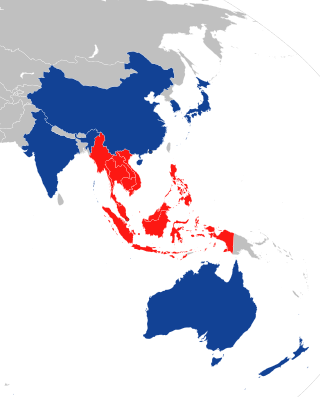
Thames Gateway is a term applied to an area around the Thames Estuary in the context of discourse around regeneration and further urbanisation. The term was first coined by the UK government and applies to an area of land stretching 70 kilometres (43 mi) east from inner east and south-east London on both sides of the River Thames and the Thames Estuary. It stretches from Westferry in Tower Hamlets to the Isle of Sheppey/Southend-on-Sea and extends across three ceremonial counties.

The ASEAN Free Trade Area (AFTA) is a trade bloc agreement by the Association of Southeast Asian Nations supporting local trade and manufacturing in all ASEAN countries, and facilitating economic integration with regional and international allies. It stands as one of the largest and most important free trade areas (FTA) in the world, and together with its network of dialogue partners, drove some of the world's largest multilateral forums and blocs, including Asia-Pacific Economic Cooperation, East Asia Summit and Regional Comprehensive Economic Partnership.

The regional chambers of England were a group of indirectly elected regional bodies that were created by the provisions of the Regional Development Agencies Act 1998. There were eight regional chambers, one for each of the regions of England except Greater London, which had opted for an elected mayor and assembly in 1998. All eight regional chambers had adopted the title "regional assembly" or "assembly" as part of their name, though this was not an official status in law. The chambers were abolished over a two-year period between 31 March 2008 and 31 March 2010 and some of their functions were assumed by newly established local authority leaders' boards.
European integration is the process of industrial, economic, political, legal, social, and cultural integration of states wholly or partially in Europe, or nearby. European integration has primarily but not exclusively come about through the European Union and its policies.

The Security and Prosperity Partnership of North America (SPP) was a supra-national level dialogue with the stated purpose of providing greater cooperation on security and economic issues. The Partnership was founded in Waco, Texas, on March 23, 2005, by Prime Minister of Canada Paul Martin, President of Mexico Vicente Fox, and U.S. President George W. Bush. It was the second of such regional-level initiatives involving the United States following the 1997 Partnership for Prosperity and Security in the Caribbean (PPS).

The Liverpool City Region is a combined authority area in North West England. It has six council areas: the five metropolitan boroughs of Merseyside and the unitary authority of Halton in Cheshire. The region had a population of 1,571,045 in 2022.

The Council of Arab Economic Unity (CAEU) was founded by Egypt, Iraq, Jordan, Kuwait, Libya, Mauritania, Palestine, Saudi Arabia, Sudan, Tunisia, Syria, United Arab Emirates and Yemen on May 30, 1964, following an agreement in 1957 by the Economic Council of the Arab League.

Local authority areas in England typically have an executive leader and a cabinet selected from the local council, similar to how the national prime minister and cabinet are selected from Parliament. In contrast, residents of some areas, or groups of areas known as combined authorities or combined county authorities, directly elect the executive mayors of their local government.

The Ministry of Housing, Communities and Local Government (MHCLG) is a ministerial department of the Government of the United Kingdom. It is responsible for housing, communities, and local government in England. It was established in May 2006 and is the successor to the Office of the Deputy Prime Minister, established in 2001. The department shares its headquarters building, at 2 Marsham Street in London, with the Home Office.
The Puget Sound Regional Council (PSRC) is a metropolitan planning organization that develops policies and makes decisions about transportation planning, economic development, and growth management throughout the four-county Seattle metropolitan area surrounding Puget Sound. It is a forum for cities, towns, counties, transit agencies, port districts, Native American tribes, and state agencies to address regional issues.

New Zealand is party to 14 free trade agreements (FTAs) worldwide. Together they accounted for over 70% of New Zealand's trade in 2023.

The Partnership for Prosperity and Security in the Caribbean (PPS) is a regional-level dialogue with the stated purpose of providing greater cooperation on security and economic issues. The Partnership was founded in Bridgetown, Barbados on March 10, 1997 by the Governments of the United States of America, Antigua and Barbuda, the Commonwealth of The Bahamas, Barbados, Belize, the Commonwealth of Dominica, the Dominican Republic, Grenada, the Co-operative Republic of Guyana, the Republic of Haiti, Jamaica, the Federation of St. Kitts and Nevis, Saint Lucia, St. Vincent and the Grenadines, the Republic of Suriname and the Republic of Trinidad and Tobago.

Local authority leaders' boards are voluntary regional associations of council leaders that have been established in England outside of Greater London to replace certain functions of the now abolished regional chambers. The establishment of the boards was part of the UK Government's Review of Sub-National Economic Development and Regeneration. which brought forward the Government's plans to alter the structure of regional governance in England and was mandated by the Local Democracy, Economic Development and Construction Act 2009. In June 2010, the new Conservative-LibDem coalition government announced plans to remove funding from the new boards and to remove their statutory functions. It was indicated that the boards might continue as voluntary associations of council leaders.

The Leeds City Region, or informally Greater Leeds, is a local enterprise partnership city region located in West Yorkshire, England. Prior to the West Yorkshire devolution deal, the partnership covered parts of South and North Yorkshire. According to the Office for National Statistics, as of 2017 the city region ranked 2nd behind Greater London for both population and GVA in the United Kingdom. It has a population of 2,320,214 million and a GVA of £69.62 billion.

A combined authority (CA) is a type of local government institution introduced in England outside Greater London by the Local Democracy, Economic Development and Construction Act 2009. CAs are created voluntarily and allow a group of local authorities to pool appropriate responsibility and receive certain devolved functions from central government in order to deliver transport and economic policy more effectively over a wider area. In areas where local government is two-tier, both must participate in the combined authority.
North American integration is the process of economic and political integration in North America, largely centred on the integration of Canada, Mexico, and the United States.

In England, local enterprise partnerships (LEPs) were voluntary partnerships between local authorities and businesses, set up in 2011 by the Department for Business, Innovation and Skills to help determine local economic priorities and lead economic growth and job creation within the local area. They carried out some of the functions previously carried out by the regional development agencies which were abolished in March 2012. In certain areas, funding was received from the UK government via growth deals. Funding for LEPs was withdrawn by the Rishi Sunak Conservative government in April 2024 and their functions were assumed by local authorities, some of whom have formed Business Boards as replacements.

The Liverpool City Region Combined Authority (LCRCA), officially the Halton, Knowsley, Liverpool, St Helens, Sefton and Wirral Combined Authority, is the combined authority of the Liverpool City Region in England. Its area includes the City of Liverpool local authority area, the Metropolitan Boroughs of Knowsley, St Helens, Sefton, and Wirral, and the Borough of Halton. It was established on 1 April 2014 by statutory instrument under the provisions of the Local Democracy, Economic Development and Construction Act 2009. Composition of the combined authority is made up of the leaders of the six principal membership authorities, plus several non-voting members with various vested interests in the activities of the combined authority.

The Regional Comprehensive Economic Partnership is a free trade agreement among the Asia-Pacific countries of Australia, Brunei, Cambodia, China, Indonesia, Japan, South Korea, Laos, Malaysia, Myanmar, New Zealand, the Philippines, Singapore, Thailand, and Vietnam. The 15 member countries account for about 30% of the world's population and 30% of global GDP, making it the largest trade bloc in history. Signed in November 2020, RCEP is the first free trade agreement among the largest economies in Asia, including China, Indonesia, Japan, and South Korea.














